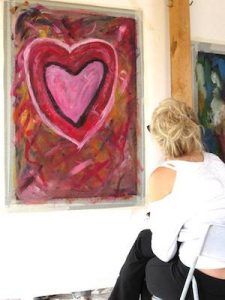
Recently I was talking with a woman who was struggling to be both self-compassionate and accountable to her intentions. She didn’t feel like she could have both.
And it got me thinking:–How common this is for so many of us who have something we want to do in life and yet feel like we don’t want to be too soft on ourselves for fear of not getting off the couch.
We’re afraid we’ll be lazy, indulgent, and passive. That if we take ourselves off the hook for not doing something we will be promoting sloth and our future is dubious at best.
Wow! What bum rap self-compassion is getting!
So what does self-compassion look like in the face of wanting to follow through on an intention? And why is it important?
To me self-compassion is the voice that acknowledges: “Wow, this is really hard, what is going on?” Or perhaps it asks us: “What might make this easier–if I could change the way I’m doing this, what would I do differently?”
Sometimes I find myself surprised when I stumble into a self-compassionate moment. You mean I don’t have to beat myself up? You mean I can wait until morning to finish this project? You mean I can ask for help? It’s okay? I did the best I could? I can leave this behind and move on?
Self-compassion gives us all a way to be with ourselves in the face of suffering, distress, and failure that is heart-based and within the present moment.
When I look up the definition of self-compassion I find: “It is a kind and mindful attentiveness to where we hurt or have failed or perceive ourselves to be inadequate. “
Tuning into our suffering does not mean we’re going to eat more donuts or skip class.
Self-compassion tunes you into your life. Not out.
Once you are in the place of tuning into yourself, you are much more likely to:
- Be flexible and change directions, stopping that which isn’t working and beginning something that will work.
- Change the timeline or deadline to one that you can achieve –which builds your self-trust and your belief in your abilities.
- Slow down the pace so that you are more sustainable and not as apt to burn out
- Ask for help. Asking for help can be the difference between a dream taking shape or falling by the wayside.
Your heart doesn’t lie. It won’t tell you to go to sleep if you’re kettle is on the stove whistling. It won’t tell you to eat another donut if you’re totally full.
The heart. Telling it like it is.
What would your life look like if you trusted your heart? If you allowed self-compassion into your ambitions?
